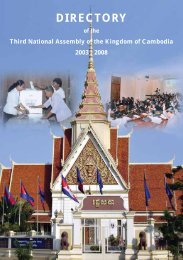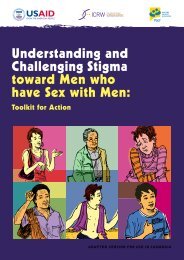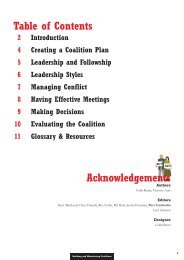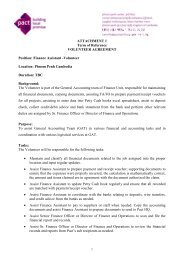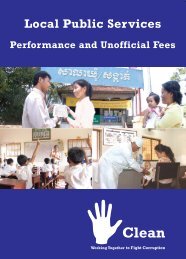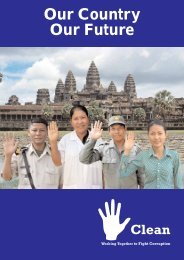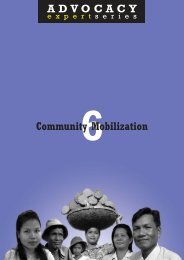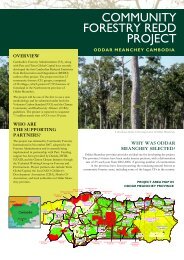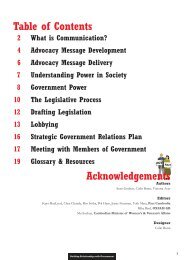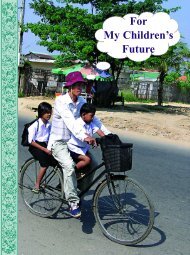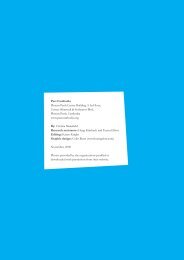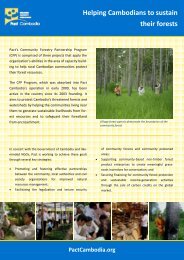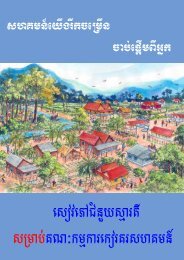Advocacy in Cambodia: Increasing Democratic ... - Pact Cambodia
Advocacy in Cambodia: Increasing Democratic ... - Pact Cambodia
Advocacy in Cambodia: Increasing Democratic ... - Pact Cambodia
Create successful ePaper yourself
Turn your PDF publications into a flip-book with our unique Google optimized e-Paper software.
Case Studies<br />
support due to the fact that sex workers are on<br />
one of the lowest social levels <strong>in</strong> <strong>Cambodia</strong>n<br />
society.<br />
Obstacles to success<br />
• Some NGOs <strong>in</strong>volved with commercial sex<br />
workers may not be advocat<strong>in</strong>g on their behalf<br />
with the dedication needed to br<strong>in</strong>g about change.<br />
• There is a general lack of understand<strong>in</strong>g<br />
about the complex causes of prostitution.<br />
• Commercial sex workers do not tend to<br />
attract widespread public support and therefore<br />
do not elicit the sympathy that other groups might<br />
(for example child laborers).<br />
Regional Anti-Traffick<strong>in</strong>g Campaign<br />
There are a number of programs that aim to<br />
address traffick<strong>in</strong>g of women and children,<br />
<strong>in</strong>clud<strong>in</strong>g those implemented by the UN Interagency<br />
Project Aga<strong>in</strong>st Traffick<strong>in</strong>g and the<br />
International Office of Migration. Traffick<strong>in</strong>g is<br />
not a new problem <strong>in</strong> Asia, and <strong>Cambodia</strong> shows<br />
similarity with other Asian countries. This section<br />
exam<strong>in</strong>es a few anti-traffick<strong>in</strong>g campaigns<br />
currently operat<strong>in</strong>g <strong>in</strong> <strong>Cambodia</strong>.<br />
AFESIP focuses solely on traffick<strong>in</strong>g and<br />
sexual abuse issues that affect women and<br />
children. The organization was founded by a<br />
<strong>Cambodia</strong>n who, while work<strong>in</strong>g as a program<br />
officer on a Medic<strong>in</strong>e Sans Frontier (MSF) AIDS<br />
prevention project for commercial sex workers <strong>in</strong><br />
the mid-1990s, was exposed to these women’s<br />
suffer<strong>in</strong>g. Although many organizations at the<br />
time were work<strong>in</strong>g with CSWs <strong>in</strong> brothels, these<br />
organizations generally targeted the workers as an<br />
HIV/AIDS problem. AFESIP, which considers<br />
prostitution an <strong>in</strong>termediary situation for women<br />
under difficult circumstances, decided to address<br />
the human rights aspect of the CSWs’ situation<br />
by offer<strong>in</strong>g <strong>in</strong>terested workers a full range of<br />
medical and social services, <strong>in</strong>clud<strong>in</strong>g mental<br />
health care, medical care, rehabilitation, and<br />
re<strong>in</strong>tegration.<br />
There are currently a number of networks<br />
work<strong>in</strong>g on behalf of children as well. For example,<br />
End<strong>in</strong>g Child Prostitution and Traffick<strong>in</strong>g<br />
(ECPAT) is a network of organizations that has<br />
been work<strong>in</strong>g on child issues <strong>in</strong> <strong>Cambodia</strong> s<strong>in</strong>ce<br />
1994. The network has decided to target tourism<br />
<strong>in</strong> its next efforts. ECPAT has good relations with<br />
the MoWA anti-traffick<strong>in</strong>g project, as well as with<br />
the National Assembly and Senate through<br />
<strong>in</strong>formal contacts. As part of its strategy to reach<br />
Parliamentarians, ECPAT advocates directly with<br />
non-profit organizations of <strong>in</strong>terest to<br />
Parliamentarians and provides them with<br />
<strong>in</strong>formation and advice. Through its efforts,<br />
ECPAT has learned that it is important to have<br />
reports ready with data and recommendations.<br />
Lawmakers and government officials tend to be<br />
so busy that it is generally useless to go to them<br />
with a problem, but very helpful to go with a<br />
solution.<br />
The <strong>Cambodia</strong>n Confederation of Women’s<br />
Organizations (CCWO) is part of the ASEAN<br />
Confederation of Women’s Organizations<br />
(ACWO), which holds meet<strong>in</strong>gs every two to three<br />
months. CCWO has successfully lobbied to have<br />
a special session on traffick<strong>in</strong>g at the next ACWO<br />
General Assembly, to be held <strong>in</strong> June 2002. This<br />
venue provides access to high-level officials (or<br />
their spouses) at the regional level. As traffick<strong>in</strong>g<br />
is really a regional problem, these contacts provide<br />
a mechanism for advocat<strong>in</strong>g for regional action<br />
aga<strong>in</strong>st traffick<strong>in</strong>g. CCWO is also plann<strong>in</strong>g to<br />
launch a regional anti-traffick<strong>in</strong>g campaign at the<br />
ACWO meet<strong>in</strong>g. There are a number of th<strong>in</strong>gs that<br />
can be done at the regional level to fight traffick<strong>in</strong>g,<br />
such as work<strong>in</strong>g with countries to harmonize laws<br />
that relate to prostitution (such as the legal age<br />
for sex).<br />
Strategies and Lessons Learned<br />
• As a large network, ECPAT is <strong>in</strong> a good<br />
position to make recommendations to the<br />
government.<br />
• <strong>Advocacy</strong> at the National Assembly and<br />
Senate is partially done through <strong>in</strong>formal contacts.<br />
• A regional lobby<strong>in</strong>g approach to<br />
elim<strong>in</strong>at<strong>in</strong>g traffick<strong>in</strong>g puts <strong>in</strong>direct pressure on<br />
<strong>in</strong>dividual countries.<br />
• Regional network<strong>in</strong>g tends to open doors<br />
to important contacts, such as spouses of high<br />
officials.<br />
• When lobby<strong>in</strong>g lawmakers, it is best to<br />
prepare reports with support documentation.<br />
Rather than approach<strong>in</strong>g them with a problem,<br />
approach them with a proposed solution.<br />
Women <strong>in</strong> Politics and Leadership 1<br />
<strong>Cambodia</strong>n women acquired the right to vote<br />
<strong>in</strong> 1947 with the <strong>in</strong>troduction of parliamentary<br />
democracy. The first woman Parliamentarian was<br />
elected <strong>in</strong> 1958. Article 35 of the 1993 Constitution<br />
guarantees women the right to participate actively<br />
<strong>in</strong> politics, though women’s participation <strong>in</strong><br />
politics is not new to <strong>Cambodia</strong> and a woman was<br />
appo<strong>in</strong>ted M<strong>in</strong>ister of Education 50 years ago.<br />
Even so, despite Constitutional provisions<br />
and the efforts of the MoWA and many NGOs, the<br />
number of women hold<strong>in</strong>g leadership positions<br />
rema<strong>in</strong>s small. Dur<strong>in</strong>g the 1993 National Assembly<br />
elections, only seven out of a total of 120 members<br />
elected were women. The 1998 National Assembly<br />
78



